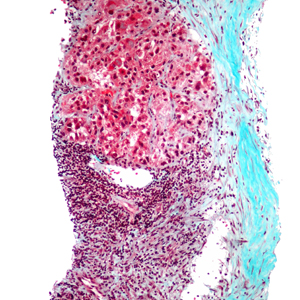A gene that fights cancer, but causes it too
By By Scott LaFee | 17 May 2011
An international team of researchers, led by scientists at the University of California, San Diego School of Medicine, and the Eastern Hepatobiliary Surgery Hospital in China, say a human gene implicated in the development of leukemia also acts to prevent cancer of the liver.
 |
| In this low-magnification micrograph, normal liver architecture is disrupted by hepatocellular carcinoma, the most common type of liver cancer. Fibrotic late-stage cirrhosis is stained blue; tell-tale Mallory bodies (keratin filament proteins) are stained pink. |
Writing in the May 17 issue of the journal Cancer Cell, Gen-Sheng Feng, PhD, UCSD professor of pathology, and colleagues in San Diego, Shanghai and Turin report that an enzyme produced by the human gene PTPN11 appears to help protect hepatocytes (liver cells) from toxic damage and death. Conversely, the same enzyme, called Shp2, is a known factor in the development of several types of leukemia.
''The new function for PTPN11/Shp2 as a tumor suppressor in hepatocellular carcinoma (HCC) stands in contrast to its known oncogenic effect in leukemogenesis,'' said Feng. ''It's a surprising finding, but one that we think provides a fresh view of oncogenesis. The same gene can have oncogenic or anti-oncogenic effects, depending upon cellular context.''
Previous studies had determined that PTPN11 was a proto-oncogene. That is, dominant active mutations in the gene had been identified in several types of leukemia patients, as was an over-expression of the gene product Shp2. Feng and colleagues looked to see what happened when Shp2 was knocked out specifically in hepatocytes in a mouse model.
The result wasn't good: The mice got liver cancer.
Strikingly, deficient or low expression of PTPN11 was detected in a sub-fraction of human HCC patient samples by researchers at the Eastern Hepatobiliary Surgery Hospital in Shanghai, China. That work was led by Hongyang Wang, MD, PhD and a professor of molecular biology.



















